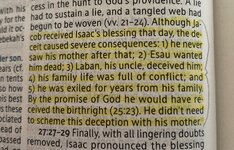Genesis 26
Issac shows many parallels with Abraham, not just in his inner character, but he even faces similar situations that Abraham had. One thing is clear, Issac is blessed by God just as Abraham was. He became a very rich man in his time living with the Philistines. So rich that they sent him away. Perhaps if they did not grow envious, but rather blessed Issac, they too would have shared in his blessing. Even though they had filled up Abraham's wells, they tried to claim Issac's renewed wells for their own. So Issac named the wells Contention and Enmity. As always, God's covenant people cannot find peace amidst their enemies. Esau takes two Hittite woman for his wives, who brought bitterness to Issac and Rebekah. Perhaps this is what Hebrews refers to when it refers to Esau as a "sexually immoral and godless person."
Genesis 27
I can't read this chapter and not feel hungry afterwards. The savory stew sounds delicious. Rebekah devises a plan to get Issac to bless Jacob over Esau. Jacob is afraid that Issac will catch on to the scheme and see Jacob as a mocker, an antagonist, but Rebekah says that she would receive the curse for Jacob.
The image of Jacob dressing up and pretending to be Esau in order to receive Issac's blessing is one of the most amazing images given for Justification.
St. Ambrose of Milan had this to say about the passage: "That Isaac smelled the odor of the garments perhaps means that we are justified not by works but by faith, since the weakness of the flesh is a hindrance to works, but the brightness of faith, which merits the pardon of sins, overshadows the error of deeds.”
Jacob is a sinner, but by putting on Esau's garments, he is able to receive Issac's blessing. He is just like us. We too are sinners, but we can put on the righteousness of Jesus Christ as if it were a robe, and receive God's blessing.
Jacob's trickery is sinful and not excusable, yet God used it to confound both Esau and Issac. Esau for his flippancy, Issac for his silly partiality towards Esau. Remember that before either of the twins were born, God promised that Jacob would receive the blessing, and yet the men carried on as if the blessing was theirs to give and take and not God's to bestow. But by refusing to bless Esau, Issac surrenders to the original word of God: that the older shall serve the younger.
To add insult to injury, Esau does exactly as Issac commands him regarding the venison, and gets denied the blessing, and seeks for it back with tears, as hypocrites love to cry. On the flip side, Jacob through all subterfuge, achieves the blessing. Does God not work in a mysterious way?
Rather than accept self-responsibility in all of this, Esau puts all of the blame on Jacob: "is he not rightly called Jacob, a supplanter?" Then he devises to kill Jacob. By pitting himself against Jacob, Esau does not come under the blessing of God's kingdom, which is in Jacob, but has effectively exiled himself from the Church. Like Cain, he is a true image of the reprobate and a type of anti-Christ.
Calvin commends Rebekah in his commentary: It is therefore an evidence of extraordinary faith, that Rebekah does not come to any agreement, but persuades her son to become a voluntary exile, and chooses rather to be deprived of his presence, than that he should give up the blessing he had once received.
If Rebekah were not a woman of faith, she would have encouraged Jacob to renounce his blessing to appease Esau for the sake of familial unity. But because she does not treat the promise of God as a flighty thing, she tells Jacob to bear his cross.

